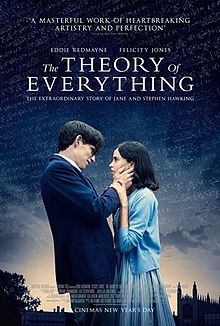
After our poor experience with The Imitation Game, it’s easy to be apprehensive about The Theory of Everything. Not only are both films biopics of famous scientists that were released in 2014, both were nominated for the Academy Awards in a bunch of categories, out of which they each ended up winning one. In the case of The Imitation Game, it was for Best Adapted Screenplay. For this one, it was the Best Actor award going to Eddie Redmayne for his portrayal of Stephen Hawking.
As it turns out, the two films are quite different because this one isn’t a biopic at all. It was adapted from the memoir by Jane Wilde, Hawking’s first wife, and as such really tells the story of their romance. Beginning from their first meeting at Cambridge University, it covers her staying with him despite his diagnosis of motor neuron disease, the increasing difficulties of taking care of him as his disease progressed and through to the end of their marriage that would ultimately last thirty years and yield three children.
The failings of this approach are obvious. The film gives only the most perfunctory of explanations of the discoveries and theories made by Hawking and convey little sense of what it is that makes him a significant scientist. In fact, outside of his relationship with Wilde, it gives us little hint of what kind of person he is at all. We never learn anything about the students that he taught for example, or that his is an active voice in politics. For uncomfortably long stretches in this film, Hawking in his wheelchair feels like a character to whom things happen instead of a person who goes out and does things. The film spends much more time exploring Wilde’s emotions and state of mind than it does Hawking’s.
Yet this approach has its advantages as well, not the least of which is that by not being a conventional biopic it doesn’t need to invoke the tiresome tropes that The Imitation Game drew so heavily on. Since it is from Wilde’s point of view, it feels deeply personal and as such easily sweeps you off your feet. By sidestepping most of the scientific details, it avoids making egregious errors or misleading statements. I especially love how it captures a broad range of emotions. There’s the deep sense of tragedy and pain of course when we see the promising young Hawking being struck down in his prime as well as sympathy with Wilde as she struggles and sacrifices to make their lives work. But there are also plenty of moments of pure joy, with each other, with their children and as he becomes more and more famous. Throughout it all, there’s this tremendous sense of how meaningful and full of value Hawking’s life is despite his disability and his suffering.
Reading up on it as I always do, I found that while not being perfect, this film seems to be remarkably true to history. The biggest divergence seems to be that the real Hawking was more stubborn and less gentle than this onscreen version. As my wife noted, it’s commendably honest on Wilde’s part to acknowledge that her relationship with family friend Jonathan Jones (played by Charlie Cox of Stardust!) began while she was still married with Hawking. If this film does go out its way to show that Hawking’s career would not have been possible without Wilde’s constant support and companionship, at least Hawking doesn’t seem to dispute that as it has his blessing and he even supplied his own computerized voice to the production.
It goes without saying that Redmayne’s performance here is outstanding. In fact, he looks so much like Hawking that the audience may forget it so there’s one clever little scene near the end to remind us that he is being played by an actor after all. The visuals have a lush, rich look that nicely captures the different eras as they pass. I think it’s also impressive how director James Marsh employs the kind of cinematic language seen in romances, with glamour and fireworks as Hawking woos Wilde, in a pouring rain with Wilde and Jones for example, while still affirming this as very much a serious film.
All this means is that while The Theory of Everything leaves plenty of room for other films and perhaps documentaries to fill in the blanks on the other aspects of Hawking’s life and it does suffer from a very misleading title, it’s a solid film about Hawking’s and Wilde’s marriage and is surprisingly entertaining to boot. It also makes for a great counter-example to the awful The Imitation Game which tried to do a little bit of everything and achieved nothing.